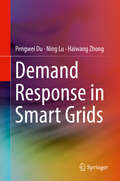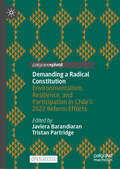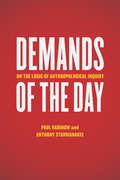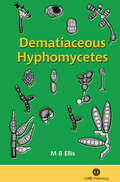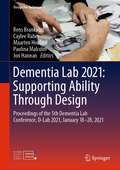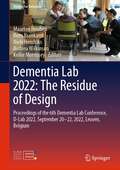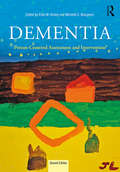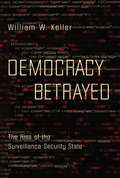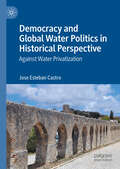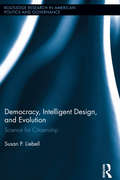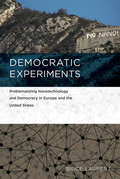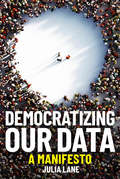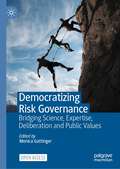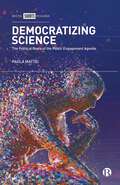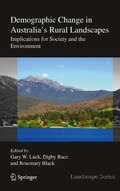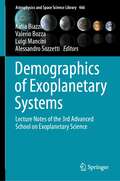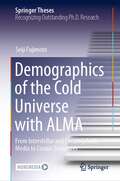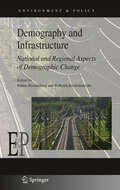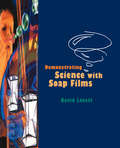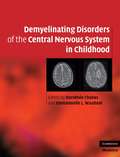- Table View
- List View
Demand Response in Smart Grids
by Ning Lu Pengwei Du Haiwang ZhongThis book is the first of its kind to comprehensively describe the principles of demand response. This allows consumers to play a significant role in the operation of the electric grid by reducing or shifting their electricity usage in response to the grid reliability need, time-based rates or other forms of financial incentives. The main contents of the book include modeling of demand response resources, incentive design, scheduling and dispatch algorithms, and impacts on grid operation and planning. Through case studies and illustrative examples, the authors highlight and compare the advantages, disadvantages and benefits that demand response can have on grid operations and electricity market efficiency.First book of its kind to introduce the principles of demand response;Combines theory with real-world applications useful for both professionals and academic researchers;Covers demand response in the context of power system applications.
Demanding Energy: Space, Time and Change
by Gordon Walker Allison Hui Rosie DayThis edited collection critically engages with an important but rarely-asked question: what is energy for? This starting point foregrounds the diverse social processes implicated in the making of energy demand and how these change over time to shape the past patterns, present dynamics and future trajectories of energy use. Through a series of innovative case studies, the book explores how energy demand is embedded in shared practices and activities within society, such as going to music festivals, cooking food, travelling for business or leisure and working in hospitals. Demanding Energy investigates the dynamics of energy demand in organisations and everyday life, and demonstrates how an understanding of spatiality and temporality is crucial for grasping the relationship between energy demand and everyday practices. This collection will be of interest to researchers and students in the fields of energy, climate change, transport, sustainability and sociologies and geographies of consumption and environment. Chapters 1 and 15 of this book are available open access under a CC BY 4.0 license at link.springer.com
Demanding a Radical Constitution: Environmentalism, Resilience, and Participation in Chile’s 2022 Reform Efforts
by Javiera Barandiaran Tristan PartridgeThis open access book documents the critical thinking and political actions that generated one of the world’s most progressive national constitutions, presented to the Chilean public in 2022. Although that text was ultimately rejected in a national referendum, it drew on decades of diverse environmental, political, Indigenous, and community organizing and contained concepts and goals at the forefront of global efforts to create more just and equitable political systems, healthier living environments, and more resilient ecosystems. Drawing on research by faculty and students from the USA and Chile, chapters within this book address political memory, Indigenous representation, public participation, the Rights of Nature, environmental law, mining conflicts, natural commons, knowledge systems, and rural education. This book highlights important contributions from Chile’s 2022 reform efforts for diverse global responses to the erosion of democracy, environmental degradation, and climate change.
Demands of the Day: On the Logic of Anthropological Inquiry
by Paul Rabinow Anthony StavrianakisDemands of the Day asks about the logical standards and forms that should guide ethical and experimental anthropology in the twenty-first century. Anthropologists Paul Rabinow and Anthony Stavrianakis do so by taking up Max Weber’s notion of the “demands of the day.” Just as the demand of the day for anthropology decades ago consisted of thinking about fieldwork, today, they argue, the demand is to examine what happens after, how the experiences of fieldwork are gathered, curated, narrated, and ultimately made available for an anthropological practice that moves beyond mere ethnographic description. Rabinow and Stavrianakis draw on experiences from an innovative set of anthropological experiments that investigated how and whether the human and biological sciences could be brought into a mutually enriching relationship. Conceptualizing the anthropological and philosophic ramifications of these inquiries, they offer a bold challenge to contemporary anthropology to undertake a more rigorous examination of its own practices, blind spots, and capacities, in order to meet the demands of our day.
Dematiaceous Hyphomycetes
by M EllisThis book is about many common and some less common hyphomycete fungi with dark conidia or conidiophores. It aims to make their identification easier and in particular enable students and amateur mycologists, as well as professionals, who do not have direct access to a large herbarium, to name a number of their own collections and isolates to species level. This group of fungi is important as it includes many pathogens of plants and animals, many species which cause spoilage of food and deterioration of paper, plastics, textiles etc, and others which are used in various industrial processes.
Dementia Lab 2021: Proceedings of the 5th Dementia Lab Conference, D-Lab 2021, January 18–28, 2021 (Design For Inclusion #2)
by Rens Brankaert Caylee Raber Maarten Houben Paulina Malcolm Jon HannanThis book gathers revised and selected contributions to the 5th Dementia Lab Conference, D-Lab 2021, organized online on January 18-28, 2021, from the Emily Carr University of Art + Design, Vancouver, Canada. It describes original strategies in which design or creative methods have been shown to uncover, support and enhance the abilities of people living with dementia. Papers report on new ideas and findings relating to three main themes: engagement, empowerment and identity. They cover: ethics of inclusion and solutions for shifting the culture of care to be focused on both personal independence and reconnecting with the community; new ways of designing with people living with dementia; strategies for breaking negative stereotypes and preconceived opinions; and approaches to retaining personhood and dignity. Offering a timely source of information on new design and creative methods to a broad community of industrial, communication, interactive and inclusive designers, this book is also meant to address and inspire various stakeholders and organizations in dementia care.
Dementia Lab 2022: Proceedings of the 6th Dementia Lab Conference, D-Lab 2022, September 20–22, 2022, Leuven, Belgium (Design For Inclusion #3)
by Rens Brankaert Maarten Houben Niels Hendriks Andrea Wilkinson Kellie MorrisseyThis book gathers the revised and selected contributions to the 6th Dementia Lab Conference, D-Lab 2022, held on September 20-22, 2022, in Leuven. It describes original and innovative research on how design can contribute to the quality of life of people with dementia, their loved ones, and caregivers. The papers highlight the value of participation within design, analyzing it at three levels: personal, product, and organizational. The presented ideas and findings address ‘The Residue of Design’ and go beyond the initial impact of the design itself by looking at what benefits design research brings for people with dementia. The papers cover topics such as the development of creative design methods to foster participation and engagement from people with dementia, evaluation studies or critical reflections that reveal the impact of products and the built environment in dementia care, and raising awareness and countering stigma in societal views on dementia.
Dementia: Person-Centered Assessment and Intervention
by Ellen Hickey Michelle S. BourgeoisPerson-centered care for persons with dementia has been developed and expanded over the last few decades. Speech-language pathologists are uniquely positioned to understand the striking impact that communication challenges have on persons with dementia and their caregivers, and can lead the charge to improve access to communication and participation. This volume serves as a starting point and reference manual for those who want to provide person-centered and life-enhancing services to persons with dementia, and to inspire the continued generation of quality research to demonstrate the value of cognitive-communication, behavioral, and caregiver interventions. It serves as a call to action for an interprofessional team of healthcare providers across healthcare settings to promote meaningful life engagement in persons with dementia using evidence-based assessment and intervention approaches. This volume provides background on the evolution of caring for persons with dementia, as well as a description of the diagnostic process for dementia syndromes and the cognitive and communication characteristics of dementias with an emphasis on Alzheimer’s dementia. Its chapters cover the person-centered assessment process for persons with cognitive and communicative disorders of dementias; intervention approaches for the wide variety of cognitive, communicative, eating/swallowing, and behavioral symptoms and consequences of dementia syndromes; reimbursement and documentation issues for various settings in which persons with dementia are seen; and issues and challenges of quality of life and end-of-life care.
Democracy Betrayed: The Rise of the Surveillance Security State
by William W. Keller“A persuasive cri de coeur from a national security expert . . . makes a spirited case for preferring untrammeled freedom to managed and monitored safety.” —Kirkus Reviews In the aftermath of 9/11, in lockstep with booming technological advancements, a new and more authoritarian form of governance is supplanting liberal democracy. The creation of the Security Industrial Complex—an “internal security state-within-the-state” fueled by tech companies, private security firms, and the Intelligence Community to the tune of $120 billion a year—is intruding on civil liberties to an unprecedented extent. As a society, we have yet to comprehend the meaning of universal digital interconnection, its impact on our psychology, and its transformation of our government and society. America is at a crossroads in contending with a security goliath; allowing the beginnings of a police state, and the conversion of our “liberal democracy” to a “secure democracy”—one where government overreaches, tramples on civil liberties, and harnesses great advancements in technology to spy on the populace. Keller walks us through what these changes can mean to our society and, more importantly, what we can do to halt our march toward intrusive and widespread surveillance. “William Keller’s warning bell for democracy is both frightening and clarifying. We are caught into a rare convergence of technology and terrorism—both of which are overwhelming average citizens. Keller will help us think clearly about what we are facing.” —William Greider, author of One World, Ready or Not and national correspondent for The Nation
Democracy and Global Water Politics in Historical Perspective: Against Water Privatization
by Jose Esteban CastroThis book addresses water privatization from a historical-sociological perspective and argues against the unrelenting imposition of neoprivatist water politics worldwide. Water is essential for life, but it is also a source of economic and political power. Prevailing water politics continues to erode the conditions of dignified living conditions of millions of human beings around the world, including many living in Western capitalist democracies. The book revisits water-related myths, fake truths, and authoritarian practices promoted or employed by International Financial Institutions, governments, and other powerful actors to keep enforcing long-failed policies grounded on ideological dogmas and short-term interests and argues for the substantive democratization of water politics and management. It rejects claims of scientific ‘neutrality’ from academics and other actors across the political spectrum who are co-responsible for the perpetuation of these conditions, interrogating the ethics of scientific-political pragmatism.
Democracy, Intelligent Design, and Evolution: Science for Citizenship (Routledge Research in American Politics and Governance)
by Susan P. LiebellShould alternatives to evolution be taught in American public schools or rejected as an establishment of religion? Democracy, Intelligent Design, and Evolution argues that accurate science education helps shape a democratic temperament. Rather than defending against Intelligent Design as religion, citizens should defend science education as crucial to three aspects of the democratic person: political citizenship, economic fitness, and moral choice. Through an examination of Tammy Kitzmiller et al. v. Dover Area School District, contemporary political theory, and foundational American texts, this volume provides an alternative jurisprudence and political vocabulary urging American liberalism to embrace science for citizenship.
Democratic Dilemmas in the Age of Ecology: Trees and Toxics in the American West
by Daniel PressEnvironmental problems present democratic dilemmas. The problems are so large and so often pit localities and interest groups against each other that they challenge basic democratic institutions, particularly the ideal of citizen participation in society's choices. In this book, Daniel Press examines the conflict between environmental political thought and democratic theory and asks whether successful environmental protection is beyond the capabilities of democratic decisionmaking.Press introduces the primary debate in this confrontation as a choice between political centralization and decentralization. Do citizens faced with environmental crises tend to look first to a centralized leadership for solutions or do they tend to respond at a more local and grassroots level? What is the role of technical expertise in this process and how does it effect public participation in these matters? Do confrontations over environmental issues increase support for a more fully democratic decisionmaking process? Representing social, political, and economic challenges to democracy, these and other questions are then investigated empirically through analyses of case studies. Focusing on two recent controversies in the western United States, ancient-forest logging in Oregon and California and hazardous waste management in California, and drawing on in-depth interviews with individuals involved, Press clarifies the relationship between environmentalism and democracy and explores the characteristics of "new" democratic forms of environmental policymaking.Revealing a need for a more decentralized process and increased individual and collective action in response to environmental crises, Democratic Dilemmas in the Age of Ecology will be of interest to a wide range of audiences, from scholars concerned with applications of democratic theory, to activists and policymakers seeking to change or implement environmental policy.
Democratic Experiments: Problematizing Nanotechnology and Democracy in Europe and the United States (Inside Technology)
by Brice LaurentAn examination of nanotechnology as a lens through which to study contemporary democracy in both theory and practice.In Democratic Experiments, Brice Laurent discusses the challenges that emerging technologies create for democracy today. He focuses on nanotechnology and its attendant problems, proposing nanotechnology as a lens through which to understand contemporary democracy in both theory and practice. Arguing that democracy is at stake where nanotechnology is defined as a problem, Laurent examines the sites where nanotechnology is discussed and debated by scientists, policymakers, and citizens. It is at these sites where the joint production of nanotechnology and the democratic order can be observed. Focusing on the United States, France, and Europe, and various international organizations, Laurent analyzes representations of nanotechnology in science museums, collective discussions in participatory settings, the making of categories such as “nanomaterials” or responsible innovation” in standardization and regulatory arenas, and initiatives undertaken by social movements. He contrasts American debates, in which the concern for public objectivity is central, with the French “state experiment,” the European goal of harmonization, and the international concern with a global market. In France, public debate proceeded in response to public protest and encountered a radical critique of technological development; the United States experimented with an innovative approach to technology assessment. The European regulatory approach results in lengthy debates over political integration; the United States relies on the adversarial functioning of federal agencies. Because nanotechnology is a domain where concerns over anticipation and participation are pervasive, Laurent argues, nanotechnology—and science and technology studies more generally—provides a relevant focus for a renewed analysis of democracy.
Democratizing Our Data: A Manifesto
by Julia LaneWhy America's data system is broken, and how to fix it.Why, with data increasingly important, available, valuable and cheap, are the data produced by the American government getting worse and costing more? State and local governments rely on population data from the US Census Bureau; prospective college students and their parents can check data from the National Center for Education Statistics; small businesses can draw on data about employment and wages from the Bureau of Labor Statistics. But often the information they get is out of date or irrelevant, based on surveys--a form of information gathering notorious for low response rates. In A Data Manifesto, Julia Lane argues that bad data is bad for democracy. Her book is a wake-up call to America to fix its broken public data system.
Democratizing Risk Governance: Bridging Science, Expertise, Deliberation and Public Values
by Monica GattingerThis open access book features contributions from a multidisciplinary team of leading and emerging scholars focused on democratization of risk assessment, management, and communication. The volume identifies and sheds light on key risk governance dilemmas related to public trust, risk perception and public participation. The first part of the book articulates the relationship among science, expertise, deliberation and public values, featuring an in-depth analysis of the concept of ‘motivated reasoning,’ and the role of trust, values and worldviews in understanding and addressing contemporary controversies over risk decision-making. The volume’s second part features eight case studies from three policy fields – energy, genomics, and public health – and a special section dedicated to vaccine decision-making for Covid-19. Chapters analyze the level, nature and mechanisms of public involvement in risk decision-making, assessing its contribution to the effectiveness and legitimacy of decisions. The case studies focus predominantly on Canada, but they draw on global scholarship and are of direct relevance for scholars and practitioners of risk governance in any country.
Democratizing Science: The Political Roots of the Public Engagement Agenda
by Paola MatteiPublic trust in the scientific community is under extraordinary pressure. Crucial areas of human activity and public policy, such as education, universities, climate and health care are influenced by populist political strategies rather than evidence-based solutions. Moreover, data-driven methods are becoming increasingly subject to delegitimization. This book examines potential remedies for improving public trust and the legitimacy of science. It reviews different policy approaches adopted by governments to incentivize the empowerment of stakeholders through co-production arrangements, participatory mechanisms, public engagement and interaction between citizens and researchers. Offering an original analysis of the political roots of the governmental impact and engagement agenda, this book sheds much-needed light on the wider connections to democracy.
Demographic Change in Australia's Rural Landscapes
by Rosemary Black Gary W. Luck Digby RaceThroughout history, humans have lived primarily in rural landscapes. In 2008, for the first time, the global population became predominantly urban. While much research has focussed on the impacts of increasing urbanisation, we have very little knowledge of the implications of these changes for rural landscapes. Global trends suggest populations in rural landscapes are, relatively speaking, in decline. Yet this broad trend is too simplistic and can be very misleading for researchers, land managers and policy makers. This generalisation often masks a much more complex and dynamic process of demographic change, with some rural areas increasing in popularity and experiencing new environmental pressures. The patterns of change can be broadly characterised in two ways: population decline and dissolving rural communities; and amenity-led in-migration (or counter-urbanisation) - a trend identified in developed regions such as North America and Australia. Both of these patterns have substantial implications for the management and sustainability of rural landscapes and communities. This book examines broad and local-scale patterns of demographic change in rural landscapes, identifying some of the drivers of these changes using local case studies, and outlining the implications of changes for society and the environment. The book adopts an interdisciplinary approach by explicitly linking demographic change with environmental, land-use, social and economic factors. The book will provide a useful resource for researchers and graduate students interested in urban development, sustainability science, landscape studies and demographic change, as well as environmental management, human and physical geography and rural sociology.
Demographics of Exoplanetary Systems: Lecture Notes of the 3rd Advanced School on Exoplanetary Science (Astrophysics and Space Science Library #466)
by Valerio Bozza Luigi Mancini Alessandro Sozzetti Katia BiazzoThis book provides a detailed, state-of-the-art overview of key observational and theoretical aspects of the rapidly developing and highly interdisciplinary field of exoplanet science, as viewed through the lenses of eight world-class experts. It equips readers with a broad understanding of the complex processes driving the formation and the physical and dynamical evolution of planetary systems. It juxtaposes theoretical modeling with the host of techniques that are unveiling the exceptional variety of observed properties of close-in and wide-separation extrasolar planets. By effectively linking ingenious interpretative analyses to the main factors shaping planetary populations, the book ultimately provides the most coherent picture to date of the demographics of exoplanetary systems. It is an essential reference for Ph.D. students and early-stage career researchers, while the scope and depth of its source material also provide excellent cues for graduate-level courses.
Demographics of the Cold Universe with ALMA: From Interstellar and Circumgalactic Media to Cosmic Structures (Springer Theses)
by Seiji FujimotoThis book presents the cold side of the Universe illustrated by the rest-frame, far-infrared emission with Atacama Large Millimeter/submillimeter Array (ALMA). The author constructed the largest-ever ALMA sample and dataset, which enables them to identify very faint, rest-frame, far-infrared dust continuums as well as the carbon fine-structure line emission from distant galaxies that have been missed in previous surveys. The observational findings described in this book reveal for the first time where and how much of the star formation, traced by the rest-frame far-infrared emission, is ongoing, from inter-stellar and circum-galactic media to cosmic structures. Moreover, since some of the findings are unexpected and as such challenge the current galaxy formation models, the book provides exciting questions that should be addressed in the next decades.
Demography and Infrastructure
by Wilhelm Kuckshinrichs Tobias KronenbergPopulation ageing has been going on for many decades, but population shrinking is a rather new phenomenon. The population of Germany, as in many other countries, has passed a plateau and is currently shrinking. Demographic change is a challenge for infrastructure planning due to the longevity of infrastructure capital and the need to match supply and demand in order to ensure cost-efficiency. This book summarises the findings of the INFRADEM project team, a multidisciplinary research group that worked together to estimate the effects of demographic change on infrastructure demand. Economists, engineers and geographers present studies from top-down and bottom-up perspectives, focusing on Germany and two selected regions: Hamburg and Mecklenburg-Western Pomerania. The contributors employed a broad range of methods, including an overlapping-generations model for Germany, regional input-output models, an energy systems model, and a spatial model of the transportation infrastructure.
Demons in Eden: The Paradox of Plant Diversity
by Jonathan SilvertownJonathan Silvertown here explores the astonishing diversity of plant life in regions as spectacular as the verdant climes of Japan, the lush grounds of the Royal Botanical Gardens at Kew, the shallow wetlands and teeming freshwaters of Florida, the tropical rainforests of southeast Mexico, and the Canary Islands archipelago, whose evolutionary novelties--and exotic plant life--have earned it the sobriquet the Galápagos of botany. Along the way, Silvertown looks closely at the evolution of plant diversity in these locales and explains why such variety persists in light of ecological patterns and evolutionary processes. In novel and useful ways, he also investigates the current state of plant diversity on the planet to show the ever-challenging threats posed by invasive species and humans. This paperback edition will include an entirely new chapter on the astonishing diversity of plant life in the Western Cape of South Africa that focuses on fynbos, a vegetation endemic to the Cape. Bringing the secret life of plants into more colorful and vivid focus than ever before, Demons in Eden is an empathic and impassioned exploration of modern plant ecology that unlocks evolutionary mysteries of the natural world.
Demonstrating Science with Soap Films
by LovettMany of us have been fascinated as children by soap bubbles and soap films. Their shapes and colours are beautiful and they are great fun to pay with. With no les intensity, scientists and mathematicians have been interested in the properties of bubbles and films throughout scientific history.In this book David Lovett describes the properties of soap films and soap bubbles. He then uses their properties to illustrate and elucidate a wide range of physical principles and scientific phenomena in a way that unifies different concepts. The book will appeal not only to students and teachers at school and university but also to readers with a general scientific interest and to researchers studying soap films. For the most part simple school mathematics is used. Sections containing more advanced mathematics have been placed in boxes or appendices and can be omitted by readers without the appropriate mathematical background.The text is supported with* Over 100 diagrams and photgraphs.* Details of practical experiments that can be performed using simple household materials.* Computer programs that draw some of the more complicated figures or animate sequences of soap film configurations.* A bibliography for readers wishing to delve further into the subject.David Lovett is a lecturer in physics at the University of Essex. His research interests include Langmiur-Blodgett thin films and the use of models as teaching aids in physics. He has been interested in soap films since 1978 and has made a number of original contributions to the subject, particularly in the use of models which change their dimensions and their analogy with phase transitions. He has published three other books including ITensor Properties of Crystals (Institute of Physics Publishing 1989).John Tilley is also a lecturer in physics at the University of Essex with research interests in theoretical solid-state physics and soap films. He is coauthor of Superfluidity and Superc
Demonstrationsexperimente gestalten: Konzeption und Umsetzung in Theorie und Praxis
by Alexander Pusch Malte S. Ubben Paul Schlummer Julia WelbergDas Vorführen von Experimenten ist in der Praxis mit ganz unterschiedlichen „Verständnis-Stolpersteinen“ für das Publikum verbunden und bei der Gestaltung des Aufbaus entstehen häufig auch ganz praktische Probleme. Dieses Buch liefert sowohl theorie- als auch erfahrungsgestütztes Wissen zur Konzeption, Ausgestaltung, Vorführung und Auswertung von Demonstrationsexperimenten an vielen konkretisierten Beispielen. Die Zielgruppen sind vor allem angehende Lehrkräfte, Lehrkräfte im Quereinstieg, Fachleitungen und Studierende, die die Faszination, die Fachmethodik und die Fachinhalte der Physik durch das Vorführen von Experimenten anderen Menschen näher bringen wollen.
Demyelinating Disorders of the Central Nervous System in Childhood
by Dorothée Chabas Emmanuelle L. WaubantAlthough multiple sclerosis and other disorders of myelin formation and repair are most commonly associated with adults, they can also occur in infants, children and adolescents. Up to 5 percent of those with MS experience symptoms before the age of 18, and the number of cases diagnosed is rising. There is a lack of awareness about these diseases in childhood, however, even amongst pediatric neurologists and MS specialists. Demyelinating Disorders of the Central Nervous System in Childhood provides comprehensive coverage of these diseases, highlighting throughout the differences between management in childhood and in adults. With sections dedicated to the diagnosis, course, treatment and biology of pediatric MS, detailed chapters on other childhood demyelinating diseases, including acute disseminated encephomyelitis, optic neuritis, acute complete transverse myelitis and neuromyelitis optica, are also provided. Essential reading for pediatric neurologists and MS specialists, this book will also be valuable reading for adult neurologists and pediatricians.
Demystifying Anorexia Nervosa: An Optimistic Guide To Understanding And Healing
by Alexander R. LucasA scientific study of the illness, as well as accounts of recovery and strategies for healing.
